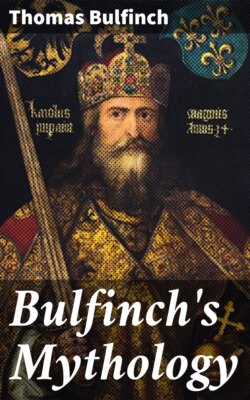Читать книгу Bulfinch's Mythology - Bulfinch Thomas - Страница 21
На сайте Литреса книга снята с продажи.
DIANA AND ACTAEON
ОглавлениеThus in two instances we have seen Juno's severity to her rivals; now let us learn how a virgin goddess punished an invader of her privacy.
It was midday, and the sun stood equally distant from either goal, when young Actaeon, son of King Cadmus, thus addressed the youths who with him were hunting the stag in the mountains:
"Friends, our nets and our weapons are wet with the blood of our victims; we have had sport enough for one day, and to-morrow we can renew our labors. Now, while Phoebus parches the earth, let us put by our implements and indulge ourselves with rest."
There was a valley thick enclosed with cypresses and pines, sacred to the huntress queen, Diana. In the extremity of the valley was a cave, not adorned with art, but nature had counterfeited art in its construction, for she had turned the arch of its roof with stones as delicately fitted as if by the hand of man. A fountain burst out from one side, whose open basin was bounded by a grassy rim. Here the goddess of the woods used to come when weary with hunting and lave her virgin limbs in the sparkling water.
One day, having repaired thither with her nymphs, she handed her javelin, her quiver, and her bow to one, her robe to another, while a third unbound the sandals from her feet. Then Crocale, the most skilful of them, arranged her hair, and Nephele, Hyale, and the rest drew water in capacious urns. While the goddess was thus employed in the labors of the toilet, behold Actaeon, having quitted his companions, and rambling without any especial object, came to the place, led thither by his destiny. As he presented himself at the entrance of the cave, the nymphs, seeing a man, screamed and rushed towards the goddess to hide her with their bodies. But she was taller than the rest and overtopped them all by a head. Such a color as tinges the clouds at sunset or at dawn came over the countenance of Diana thus taken by surprise. Surrounded as she was by her nymphs, she yet turned half away, and sought with a sudden impulse for her arrows. As they were not at hand, she dashed the water into the face of the intruder, adding these words: "Now go and tell, if you can, that you have seen Diana unapparelled." Immediately a pair of branching stag's horns grew out of his head, his neck gained in length, his ears grew sharp-pointed, his hands became feet, his arms long legs, his body was covered with a hairy spotted hide. Fear took the place of his former boldness, and the hero fled. He could not but admire his own speed; but when he saw his horns in the water, "Ah, wretched me!" he would have said, but no sound followed the effort. He groaned, and tears flowed down the face which had taken the place of his own. Yet his consciousness remained. What shall he do?—go home to seek the palace, or lie hid in the woods? The latter he was afraid, the former he was ashamed, to do. While he hesitated the dogs saw him. First Melampus, a Spartan dog, gave the signal with his bark, then Pamphagus, Dorceus, Lelaps, Theron, Nape, Tigris, and all the rest, rushed after him swifter than the wind. Over rocks and cliffs, through mountain gorges that seemed impracticable, he fled and they followed. Where he had often chased the stag and cheered on his pack, his pack now chased him, cheered on by his huntsmen. He longed to cry out, "I am Actaeon; recognize your master!" but the words came not at his will. The air resounded with the bark of the dogs. Presently one fastened on his back, another seized his shoulder. While they held their master, the rest of the pack came up and buried their teeth in his flesh. He groaned—not in a human voice, yet certainly not in a stag's—and falling on his knees, raised his eyes, and would have raised his arms in supplication, if he had had them. His friends and fellow-huntsmen cheered on the dogs, and looked everywhere for Actaeon, calling on him to join the sport. At the sound of his name he turned his head, and heard them regret that he should be away. He earnestly wished he was. He would have been well pleased to see the exploits of his dogs, but to feel them was too much. They were all around him, rending and tearing; and it was not till they had torn his life out that the anger of Diana was satisfied.
In Shelley's poem "Adonais" is the following allusion to the story of Actaeon:
"'Midst others of less note came one frail form,
A phantom among men: companionless
As the last cloud of an expiring storm,
Whose thunder is its knell; he, as I guess,
Had gazed on Nature's naked loveliness,
Actaeon-like, and now he fled astray
With feeble steps o'er the world's wilderness;
And his own Thoughts, along that rugged way,
Pursued like raging hounds their father and their prey."
Stanza 31.
The allusion is probably to Shelley himself.
